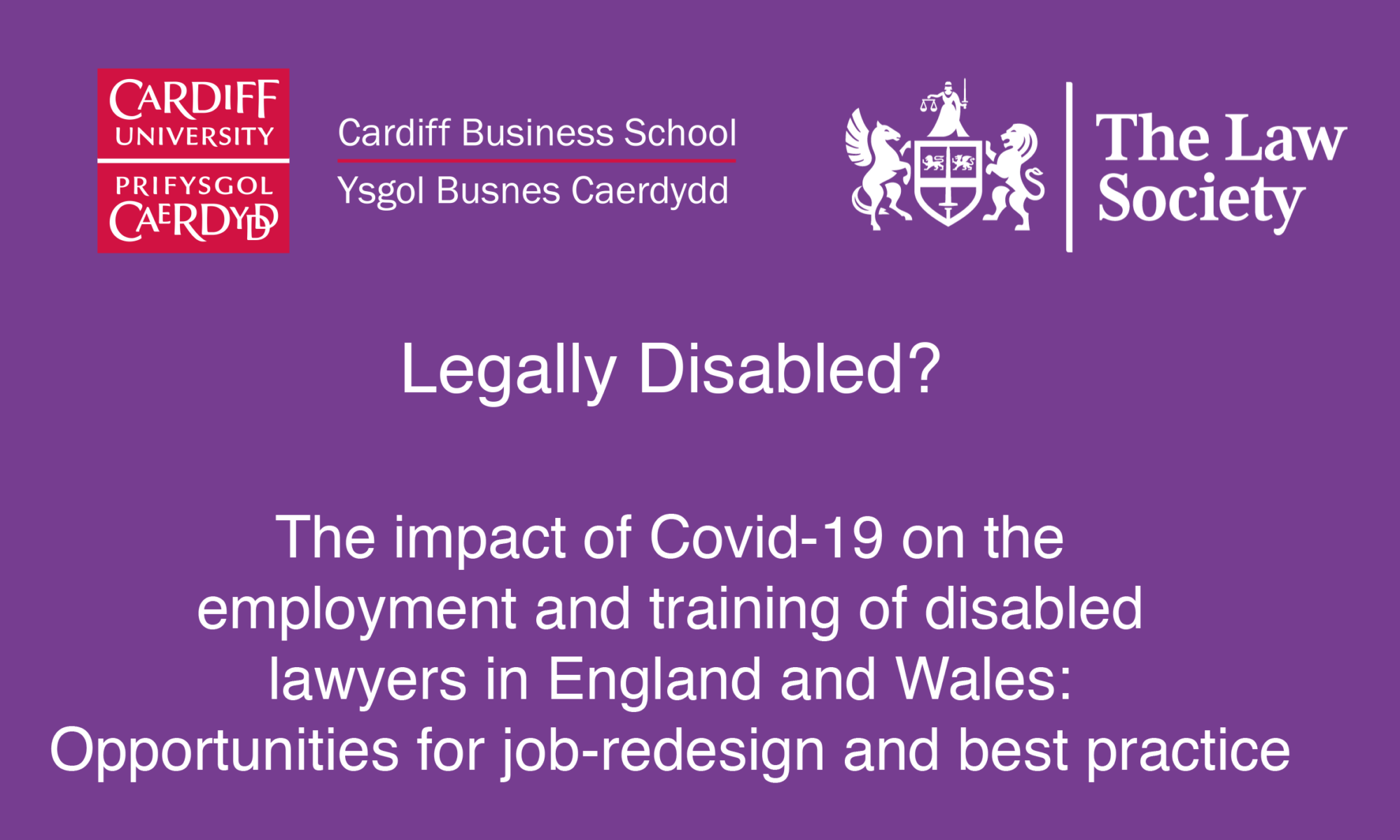Greater flexibility could enhance access to the profession for disabled lawyers
Our new research on how disabled lawyers have been affected by the Covid-19 pandemic shows increased remote working and more flexibility with reasonable adjustments could make the legal profession more accessible.
During the Covid-19 lockdown, many law firms, legal businesses and in-house teams began working from home for all staff – a reasonable adjustment which many disabled lawyers had requested before the pandemic.
A survey of over 100 disabled lawyers, launched by the Law Society of England and Wales in partnership with the Legally Disabled Research Team based at Cardiff University, found working from home during the Covid-19 outbreak enabled the majority of respondents to manage their disability more effectively. 70% of those surveyed would prefer to continue working remotely in the long-term.
Download the report
One respondent said: “It’s easier to work from home, as everyone is doing so, which is useful for me. Because everyone is asking for adjustments, it normalises it for those with disabilities who need them.”
However, some aspects of remote working did not prove as beneficial. Experiences of remote job interviews and work experience were varied, with many citing technological glitches and the accessibility of online tests as barriers.
Another key issue raised was reasonable adjustments – 19% of respondents found it easy or very easy to request reasonable adjustments during the period surveyed, compared with 18% who indicated they found it difficult or extremely difficult and 17% did not know what adjustments were available to them.
Only 52% of respondents said they already had reasonable adjustments in place prior to Covid-19. This is a relatively low figure but not entirely surprising, given Legally Disabled’s previous findings that many disabled lawyers were reluctant to disclose or typically under-disclosed their impairments to their employer.*
Interestingly, 9% and 19% disclosed to their current employer and colleagues respectively for the first time during lockdown. Many reported finding colleagues more supportive than employers – possibly due to shared experience of the Covid-19 lockdown.
“Our research clearly shows that increased remote and flexible working have the potential to make the legal profession more accessible to disabled solicitors. We hope firms will take this into account when making future plans for remote working,” said Law Society president David Greene.
“However, it is concerning to see that 17% of respondents did not know which reasonable adjustments might benefit them. Everyone should feel comfortable bringing their full self to work and supported in asking for any reasonable adjustments.
“The most commonly requested adjustment which was not provided was disability awareness training for colleagues. Firms and legal businesses should ensure adjustments which seek to change to their culture and attitudes – not just physical or remote working adjustments – are considered in their long-term diversity plans.”
Debbie Foster, lead researcher on the Legally Disabled project and Professor of Employment Relations and Diversity at Cardiff University, said: “In most cases, homeworking has given disabled people greater control over how they manage their impairment and working environment. We found many disabled people experienced higher levels of trust and autonomy during lockdown and found training, career development and networking more inclusive and accessible.
“The business case for homeworking as a reasonable adjustment in this respect has been well and truly made! However, we caution against over-generalisations and highlight the importance of choice to avoid disabled people being ‘ghettoised’ in the home in a post-Covid world.
“Homeworking creates new and exciting opportunities for imaginative and inclusive job redesign in a sector that has clung to traditional practices, but the real future challenge will be to develop an inclusive and integrated model of hybrid working that enables disabled people to access public as well as private spaces,” she added.
Download the report below:
Notes to editors
The survey was co-designed by the Legally Disabled team with the Law Society’s Lawyers with Disabilities Division (LDD) and members of their Diversity and Inclusion team.
The survey ran from the 23rd July to 16th August 2020 and asked 108 respondents questions relevant to their work during the period from lockdown in March of 2020 to July/ August of 2020. It was restricted to disabled lawyers in training or employment or actively seeking training and employment, who saw their professional body as the Law Society of England and Wales.
The survey report was launched at The impact of COVID-19 on disabled solicitors webinar with Legally Disabled and the Law Society on 2 November 2020 12.30 – 2pm.
*Research by Legally Disabled in January 2020 found that 40% of those surveyed either never or only sometimes tell their employer or prospective employer they are disabled.
About the Law Society
The Law Society is the independent professional body that works globally to support and represent solicitors, promoting the highest professional standards, the public interest and the rule of law.
About Legally Disabled
Funded by the Disability Research into Independent Living and Learning programme, the Legally Disabled? research project is led by Professor Debbie Foster and freelance co-researcher Dr Natasha Hirst.
Their co-produced research aims to discover why disabled people are seemingly unexpected in the legal profession and what more can be done to create a culture of inclusion and access.
Press office contact: Emma Clarke | 0208 049 3743

